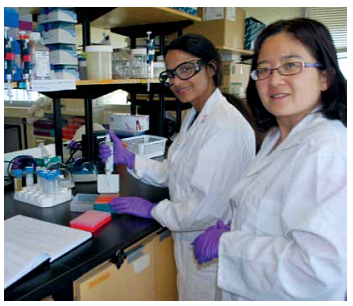Room to Grow
UAlberta International - 13 January 2021

Dr. Leluo Guan (R) with a colleague in a laboratory.
What began in 2008 as a faculty-based partnership between the U of A Faculty of Engineering and RWTH Aachen, one of Germany’s top research and teaching universities, has blossomed into a robust, university-wide collaboration that advances leading-edge research on both sides of the Atlantic.
“We have worked hard to develop a strong, multidimensional partnership with RWTH Aachen, particularly in relation to our shared interests in sustainable energy, computer sciences, and engineering,” said Dr. Alex Kuznetsov, a regional manager in U of A International. Recently, Kuznetsov worked with the Vice-President (Research and Innovation) office to facilitate a joint seed funding call that aims to lay a foundation for innovative, high-risk research collaborations between the two institutions. “The funding call was a natural step in the evolution of the relationship,” Kuznetsov affirmed.
U of A researchers from the faculties of Science, Engineering, and Agricultural, Life & Environmental Sciences (ALES) joined with their counterparts at RWTH Aachen to apply for seed funding. Out of 16 projects, seven projects worth a total of $720,000 were selected. RWTH Aachen contributed half of the funds using support it received through the German government’s Excellence Initiative, designed to bolster leading research at their top universities. The other half came from UAlberta in the form of in-kind commitments, contributions from professors and funds from the VPRI office.
“Our faculty members and students recognize the importance of international collaboration,” said Dr. Cen Huang, Vice-Provost and Associate Vice-President (International). “They want to work with the best in their field, and it’s easier to do that if they can cross borders. With partners like RWTH Aachen, they can consider specific angles that no one else in Canada has considered. It’s all about providing additional synergy.”
Dr. Randy Goebel, Associate Vice-President (Research Partnerships), noted, “We were pleased at the strong interest of professors on both sides in the seed funding program - there are clearly good opportunities to build on the research strengths of our two institutions. We see many complementary strengths where collaboration will help create new value.”
Dr. Leluo Guan, a professor of functional genomics and microbiology in the Faculty of Agricultural, Life and Environmental Sciences (ALES), will spearhead one of the newly funded projects with Dr. Mathias Hornef, a professor for medical microbiology at RWTH Aachen. Dr. Guan’s research focuses on manipulating gut microbes and genetic selection to make Alberta beef cattle healthier and more environmentally friendly. “I was one of the first researchers in the ruminant research field to start looking at microbes and their impact on health from birth,” she explained.
At RWTH Aachen, Dr. Hornef conducted similar research in mice models. “We decided to combine forces to determine whether or not we could identify a regulatory mechanism that is common to all neonatal mammals,” explained Dr. Guan. “Ultimately, we hope to generate a landmark study in our field. We’re excited to learn from each other and continue building ties between our two departments.”
In the Faculty of Engineering, Dr. Peichun Amy Tsai researches problems in fluid mechanics with direct applications to topics like membrane technology and enhanced oil retrieval. A year before the joint seed funding opportunity arose, RWTH awarded her a senior research fellowship, which involved spending time in Germany to collaborate with RWTH researchers on a project related to liquid displacement and microscopic flows. Dr. Tsai then received funding through the seed grant program to build on her collaboration.
“The seed funding we received allows us to continue the research we began together in Germany,” she shared. “Now, we have the freedom to explore riskier ideas that lead to greater impact.”
By all accounts, the partnership between UAlberta and RWTH Aachen has enormous potential to expand in the future. “Our hope is that this initial seed funding round will lead to even more ambitious research and funding opportunities down the road,” said Kuznetsov. “We’re excited to see what comes next.”